Russia’s growing isolation has strengthened the ‘siloviki’ who surround the president
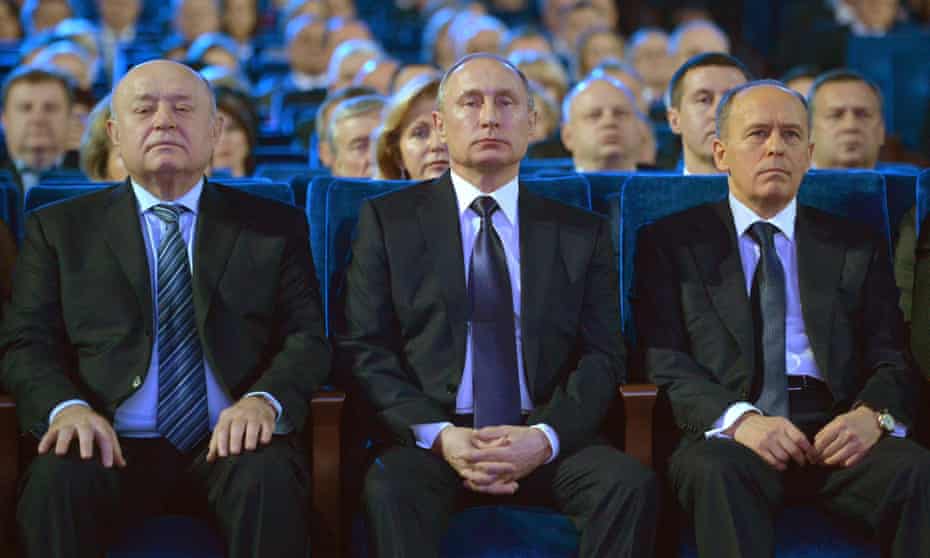
Vladimir Putin with FSB head Alexander Bortnikov (right)
and other officials on Security Services Day in Moscow in 2015.
Photograph: Aleksey Druginyn/Sputnikvosti pool//EPA
Andrew Roth Moscow correspondent
Fri 4 Feb 2022
When Viktor Yanukovych sought to flee Ukraine as he was removed from the presidency in 2014, Vladimir Putin urgently summoned the heads of his military, security, and spy agencies for an all-night meeting on how to extract him. As they broke up at seven in the morning, he recalled, he told them: “We must start working on returning Crimea to Russia.”
In Putin’s telling, he was alone with his top security officials when he made one of the most fateful decisions of his political career.
Since then, Russia’s growing isolation has only strengthened the so-called siloviki, the Russian security men who have surrounded him, many of whom served in the KGB and have maintained conservative, often conspiratorial political views.
We do not know exactly how Putin makes his most important political decisions. Tatyana Stanovaya, the founder of political analysts R.Politik, recently divided the Russian elite into two groups: technocrats who dominate government but “have no remit to interfere in security matters” and the siloviki who “dominate the agenda, fuel Putin’s anxieties and provoke and escalate tension”.
As Russia gathers troops and appears ready to launch an attack in Ukraine, these security advisers may have an outsize effect on what happens next.
Nikolai Patrushev
Andrew Roth Moscow correspondent
Fri 4 Feb 2022
When Viktor Yanukovych sought to flee Ukraine as he was removed from the presidency in 2014, Vladimir Putin urgently summoned the heads of his military, security, and spy agencies for an all-night meeting on how to extract him. As they broke up at seven in the morning, he recalled, he told them: “We must start working on returning Crimea to Russia.”
In Putin’s telling, he was alone with his top security officials when he made one of the most fateful decisions of his political career.
Since then, Russia’s growing isolation has only strengthened the so-called siloviki, the Russian security men who have surrounded him, many of whom served in the KGB and have maintained conservative, often conspiratorial political views.
We do not know exactly how Putin makes his most important political decisions. Tatyana Stanovaya, the founder of political analysts R.Politik, recently divided the Russian elite into two groups: technocrats who dominate government but “have no remit to interfere in security matters” and the siloviki who “dominate the agenda, fuel Putin’s anxieties and provoke and escalate tension”.
As Russia gathers troops and appears ready to launch an attack in Ukraine, these security advisers may have an outsize effect on what happens next.
Nikolai Patrushev
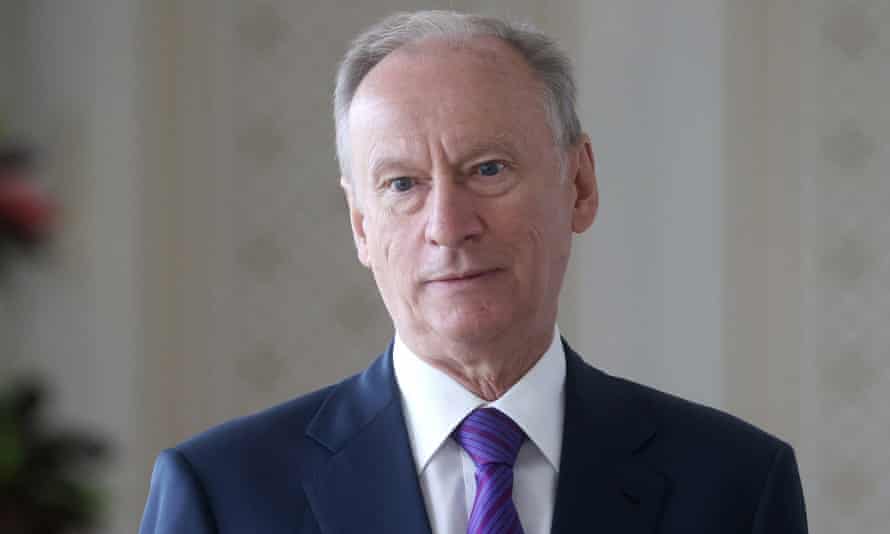
Nikolai Patrushev, head of Russia’s security council.
Photograph: Pavel Orlovsky/BelTA/Tass
The head of Russia’s security council and a “hawk’s hawk”, Patrushev plays the informal role of Putin’s national security adviser. A career intelligence officer, Patrushev has known Putin since the 1970s, when the two men worked together in the Leningrad KGB. He later succeeded Putin as head of the FSB and has chaired the security council since 2008. His interviews have revealed him as a conspiracy theorist who believes that western powers are seeking to destroy Russia. The United States “would much rather that Russia did not exist at all. As a country,” he said in a 2015 interview.
His rhetoric on Ukraine, which he calls a “protectorate” of the west, has resembled that of Putin. “At any moment, there’s potential in Ukraine for an outburst of tensions so strong that millions of Ukrainians will flee to seek refuge in other places,” he said in a recent interview that predicted a possible conflict.
Patrushev has also been accused of approving assassinations and other illegal operations. A UK public inquiry in 2016 found that “the FSB operation to kill [Alexander] Litvinenko was probably approved by Mr Patrushev”. And diplomatic sources have told the Guardian that the Russian operatives accused of trying to overthrow the government of Montenegro in 2016 were allowed to leave the country on Patrushev’s plane. He also chairs the Russian volleyball federation.
Sergei Naryshkin
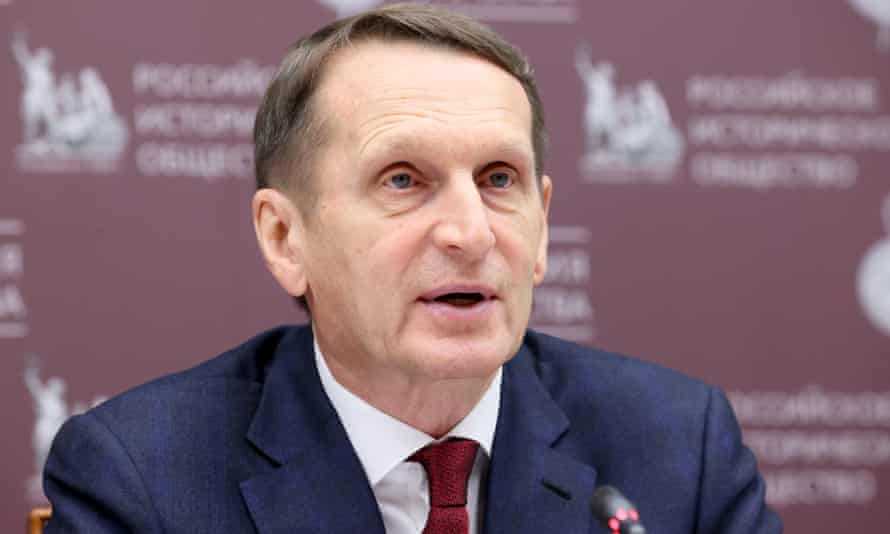
Sergei Naryshkin, head of Russia’s foreign intelligence service.
Photograph: Sergei Savostyanov/Tass
The head of Russia’s foreign intelligence service, Naryshkin is reportedly a former KGB officer and has known Putin since at least the 1990s, when the two worked at the St Petersburg mayor’s office. Naryshkin is a Putin loyalist who followed the Russian leader into the Kremlin, serving as his deputy head of economic development from 2004, then as the head of Dmitry Medvedev’s presidential administration from 2008, and then the chairman of the State Duma parliament from 2011-2016. He is an effective functionary and polished speaker who has occasionally been suggested as a potential successor to Putin.
Naryshkin is also a hardliner who engages in conspiracy theories. In an interview earlier this year, he said that the poisoning of Kremlin critic Alexei Navalny was a western plot to support the Russian opposition by finding a “sacrificial victim”. Earlier this year, he compared the government of Ukraine to “Hitler’s occupation”. He also has an edge: asked if he had ever been betrayed, he told an interviewer that “one thing soothes me: these traitors have either already burned in the fires of hell or will certainly do so”.
He heads the Russian Historical Society, which has played an aggressive role in promoting favourable interpretations of Russia’s history, a pet project of Putin’s.
Alexander Bortnikov
The head of Russia’s foreign intelligence service, Naryshkin is reportedly a former KGB officer and has known Putin since at least the 1990s, when the two worked at the St Petersburg mayor’s office. Naryshkin is a Putin loyalist who followed the Russian leader into the Kremlin, serving as his deputy head of economic development from 2004, then as the head of Dmitry Medvedev’s presidential administration from 2008, and then the chairman of the State Duma parliament from 2011-2016. He is an effective functionary and polished speaker who has occasionally been suggested as a potential successor to Putin.
Naryshkin is also a hardliner who engages in conspiracy theories. In an interview earlier this year, he said that the poisoning of Kremlin critic Alexei Navalny was a western plot to support the Russian opposition by finding a “sacrificial victim”. Earlier this year, he compared the government of Ukraine to “Hitler’s occupation”. He also has an edge: asked if he had ever been betrayed, he told an interviewer that “one thing soothes me: these traitors have either already burned in the fires of hell or will certainly do so”.
He heads the Russian Historical Society, which has played an aggressive role in promoting favourable interpretations of Russia’s history, a pet project of Putin’s.
Alexander Bortnikov
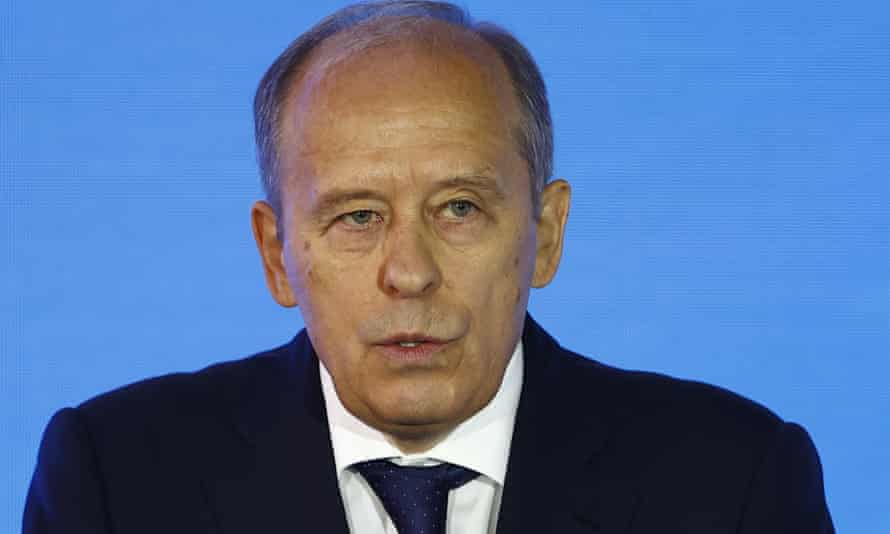
Alexander Bortnikov, head of the FSB.
Photograph: Anadolu Agency/Getty Images
The head of Russia’s FSB, the domestic security and intelligence service, Bortnikov plays a key role in maintaining Putin’s control of the country. The sprawling security apparatus employs hundreds of thousands of people and is responsible for everything from counter-terrorism to border security, counterintelligence, electronic surveillance and, unofficially, terrorising the political opposition. Bortnikov has also known Putin since the 1970s, when both served in the Leningrad KGB. He is seen as having less influence on Putin than Patrushev or Naryshkin.
Bortnikov and Patrushev’s sons have become powerful Russian officials. Dmitry Patrushev is Russia’s minister for agriculture and Denis Bortnikov is the deputy president and chairman of the state-run VTB Bank’s management board. US lawmakers have included both on draft lists for sanctions because of their fathers’ proximity to Putin.
Sergei Shoigu
The head of Russia’s FSB, the domestic security and intelligence service, Bortnikov plays a key role in maintaining Putin’s control of the country. The sprawling security apparatus employs hundreds of thousands of people and is responsible for everything from counter-terrorism to border security, counterintelligence, electronic surveillance and, unofficially, terrorising the political opposition. Bortnikov has also known Putin since the 1970s, when both served in the Leningrad KGB. He is seen as having less influence on Putin than Patrushev or Naryshkin.
Bortnikov and Patrushev’s sons have become powerful Russian officials. Dmitry Patrushev is Russia’s minister for agriculture and Denis Bortnikov is the deputy president and chairman of the state-run VTB Bank’s management board. US lawmakers have included both on draft lists for sanctions because of their fathers’ proximity to Putin.
Sergei Shoigu
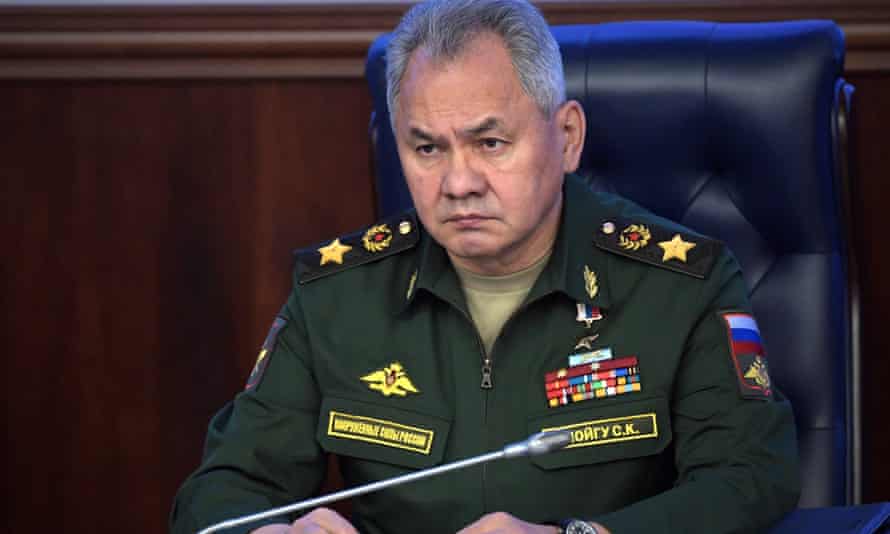
Sergei Shoigu, Russia’s defence minister.
Photograph: Sergei Guneyev/Tass
Shoigu did not serve in the KGB or the military and his role as minister of defence makes him as much a technocrat as a silovik. But his oversight of the modernised Russian military, including the aggressive GRU military intelligence agency, means that he is often involved in key security decisions or at least in their implementation. It was Shoigu’s order that ended the sudden buildup of troops in March-April that first set alarm bells in Europe ringing about the potential for a new Russian invasion of Ukraine. And he has appeared in Belarus this week to oversee war games that could serve as a cover to prepare for an attack.
Shoigu is from Tuva, a Buddhist republic in Siberia that borders Mongolia. Putin and Shoigu regularly take short hunting and fishing vacations in Siberia, which give Shoigu direct, unimpeded access to the Russian president. Evgeny Minchenko, a political analyst who puts together a power ranking of Russian officials, said earlier this year: “Right now, there’s only one member from the cabinet who is in the ‘politburo 2.0’. And that’s Shoigu.”
Shoigu did not serve in the KGB or the military and his role as minister of defence makes him as much a technocrat as a silovik. But his oversight of the modernised Russian military, including the aggressive GRU military intelligence agency, means that he is often involved in key security decisions or at least in their implementation. It was Shoigu’s order that ended the sudden buildup of troops in March-April that first set alarm bells in Europe ringing about the potential for a new Russian invasion of Ukraine. And he has appeared in Belarus this week to oversee war games that could serve as a cover to prepare for an attack.
Shoigu is from Tuva, a Buddhist republic in Siberia that borders Mongolia. Putin and Shoigu regularly take short hunting and fishing vacations in Siberia, which give Shoigu direct, unimpeded access to the Russian president. Evgeny Minchenko, a political analyst who puts together a power ranking of Russian officials, said earlier this year: “Right now, there’s only one member from the cabinet who is in the ‘politburo 2.0’. And that’s Shoigu.”
No comments:
Post a Comment